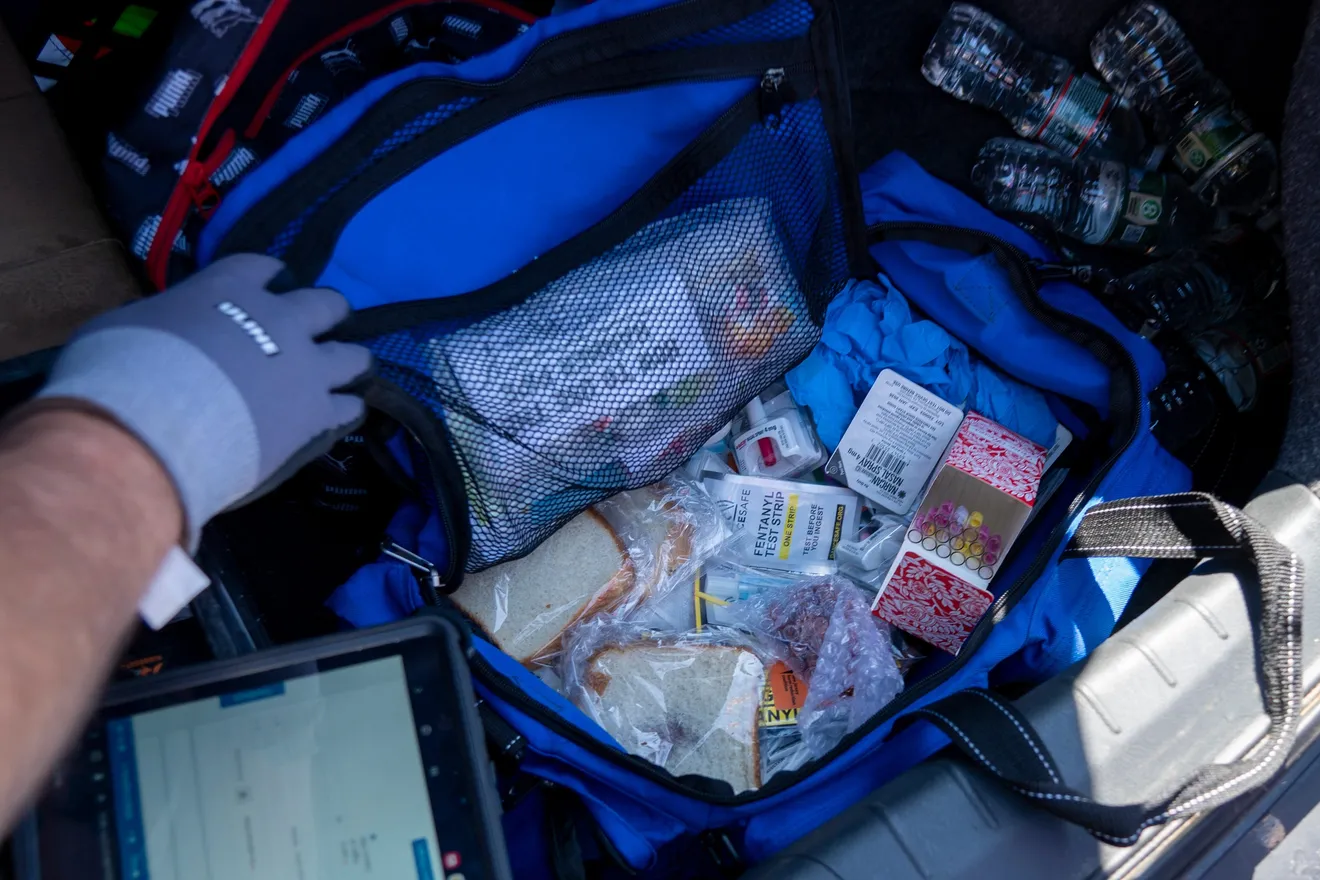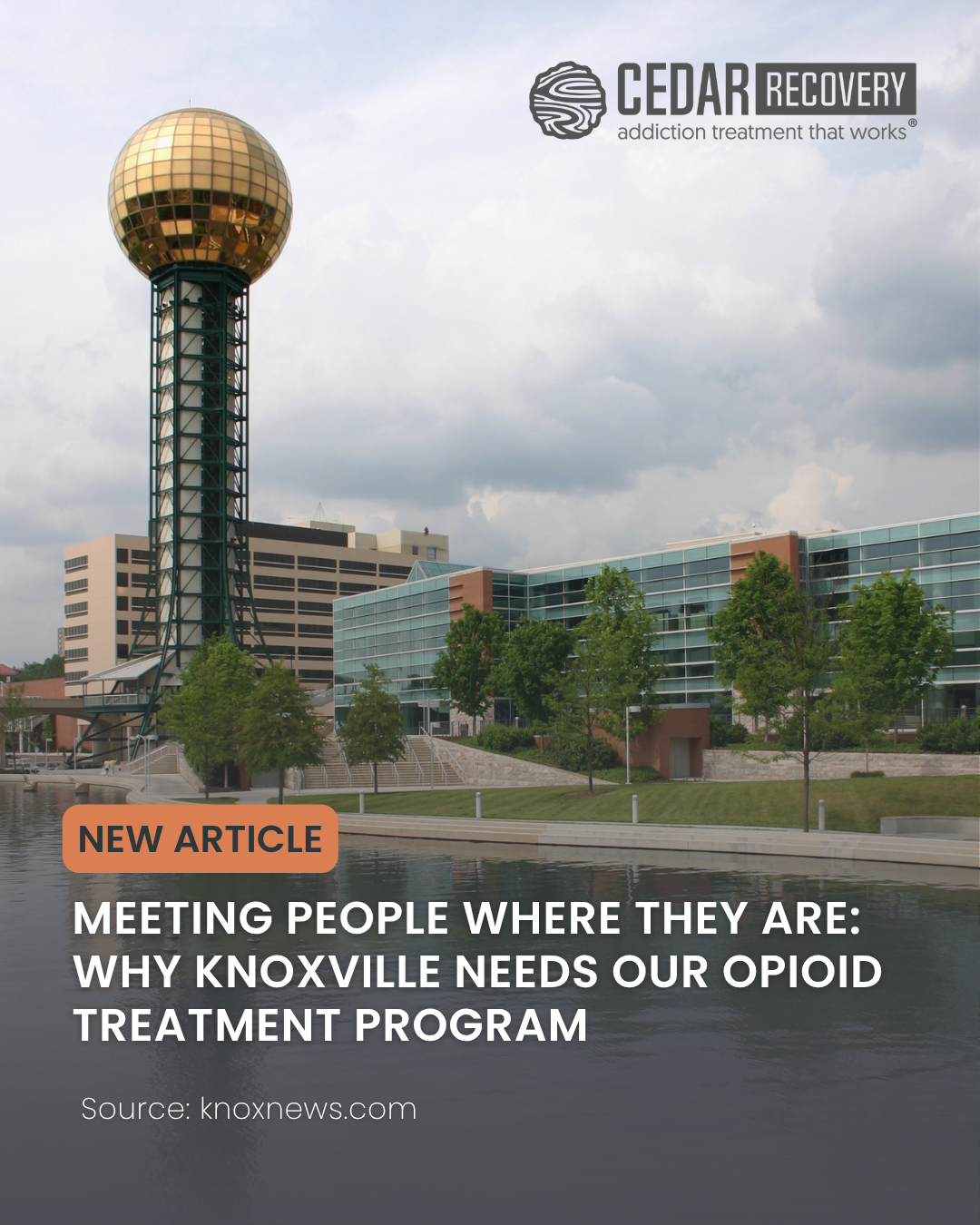Cedar Recovery marks the newest Opioid Treatment Program in Knox County since 2003. Paul Trivette, the chief strategy officer for Cedar Recovery, noted that the Tennessee Department of Mental Health and Substance Abuse Services suspended the two previous methadone programs in Knoxville and could not take new patients in 2023.
“Imagine needing methadone treatment, and you don’t have one facility that can take you,” Trivette said. “That … should have been concerning for people in Knox County.”
The Tennessee Department of Mental Health and Substance Abuse Services did not give Trivette and his team reasons regarding the suspension, even after submitting a freedom of information request. Fortunately, Trivette was notified that the programs are no longer under suspension.
One of Cedar Recovery’s initiatives is to join the community and fight the opioid battle in Knoxville. This organization opened its new methadone treatment center in South Knoxville, offering great flexibility.
The facility is located near a KAT bus stop in the Chapman Square Shopping Center, offering easier access and more seclusion. The organization will also provide afternoon and evening hours — Cedar Recovery is the first OTP in Knox County and the state of Tennessee to offer these hours.
Cedar Recovery’s new facility is accessible, and it plans to network with all insurance companies, including United Healthcare, TennCare, Exchange Insurances, Medicare and Commercial plans. A self-pay rate will also be provided for people with limited insurance access to gain scholarships and charity care.
For Trivette, his father’s substance disorder is what inspired him to join law enforcement. From Trivette’s personal experiences with his father, he learned that all of the resources and accessibility Cedar Recovery provides are nothing without people attracted to go into treatment.
“That is something that my father had great difficulty doing himself because there’s so much stigma. … But I think that the people who are going to walk into our door, the people who are going to seek treatment with us, are going to feel a way that they never felt before,” Trivette said. “They’re going to engage with a team that they’ve not felt that way before. Our goal is to attract more people into care, that treatment is doable and worth it. We’re going to do that through this comprehensive approach that we provide between medications, counseling and peer recovery support.”
Lisa Case, the Opioid Treatment Program director for Cedar Recovery, added that Cedar Recovery will fill some of the gaps by offering daily pay and having zero barriers to admission, making every person’s journey to recovery attainable.
A facility like Cedar Recovery is more vital now than ever — more than 9,900 adults in Knox County have an Opioid Use Disorder, and only 17% receive care from one of Knox County’s existing opioid treatment facilities.
Given these alarming statistics, the pressing yet critical question is: why Knoxville?
Case indicated one supporting reason as to why the opioid crisis continues to strike Knoxville — the flow of transportation.
Interstate 75 connects the southern states where the drugs are trafficked from Mexico, making Knoxville a critical drop-off point since the ‘synthetic part of fentanyl is manufactured in China,’ according to Case.
A tranquilizer for animals prescribed by veterinarians — Xylazine, also known as Tranq, is adding to Knoxville’s opioid use issue. According to Case, Tranq doesn’t respond to Narcan, posing a serious problem.
“It is not supposed to be used for human consumption because it doesn’t have the same preservative in it,” Case said. “So a lot of times these folks that are selling drugs in the area will mix Tranq in there … a lot of times folks think they’re buying heroin, but in fact, what they end up with is a little bit of heroin is a lot of fentanyl and a lot of xylazine in it.”
According to Case, several dangers accompanied Xylazine when it arrived in Knoxville 18 to 24 months ago, contributing to its designation as a ‘high-need county.’
“Until then, it (Xylazine) had been seen a lot on the West Coast,” Case said. “But once it came, that presented a new problem in addition to the enormous fentanyl problem. And then there are a lot of pressed pills, fake pills where they crush a little bit of Xanax or whatever, then they mix a whole lot of fentanyl in it.”
With the rise in addictive elements in the mix with opioids, Knoxville’s extreme opioid overdose stats have skyrocketed so high that the county is now compared to West Virginia — the worst rates of opioid overdoses in the United States.
According to Case, West Virginia is the most affected area due to coal camps and mining, where Oxycontin only increased the rate of addiction.
“When we petitioned the state (Tennessee) for the certificate of need, we had a 94 per 100,000 overdose death rate, compared to West Virginia, which was at 93 — the worst in the country,” Trivette said. “So, given that, Knoxville had the worst overdose death rate, looking at some statistics as well regarding the number of people that had Opioid Use Disorder versus those receiving method treatment less than 20%.”
To introduce its new location, Cedar Recovery launched an open house for Knoxville residents to learn more about its mission. The company received considerable support from Mayor Kincannon, State Sen. Richard Briggs, Commissioner Larson Jay, the Metro Drug Coalition and other treatment programs.
“It may have been a scary time and a nervous time just because they had never walked foot in there before, but they probably had some preconceived notions as to what it may look like, and I think that they were shocked to see how beautiful of a facility it is, how welcoming it is and how friendly our team is,” Trivette said.
Cedar Recovery challenges the typical three-strikes rule often used in addiction treatment.
“If we kick them out of our program, where are they going to go? What’s going to happen? Are they going to overdose? Are they going to go back to the streets? We don’t know,” Trivette said.
To prevent finding those answers the hard way, Cedar Recovery takes a different approach. They care about meeting patients where they are because the road to healing is not perfect.
It takes leaders like Case and Trivette to recognize this issue and do something about it.
“That is our promise to patients that show up with us,” Trivette said. “If you stay on that recovery path that we lay out for you, those three things will become true. You’re going to feel better, get better, and stay better.”
Source: UT Daily Beacon




